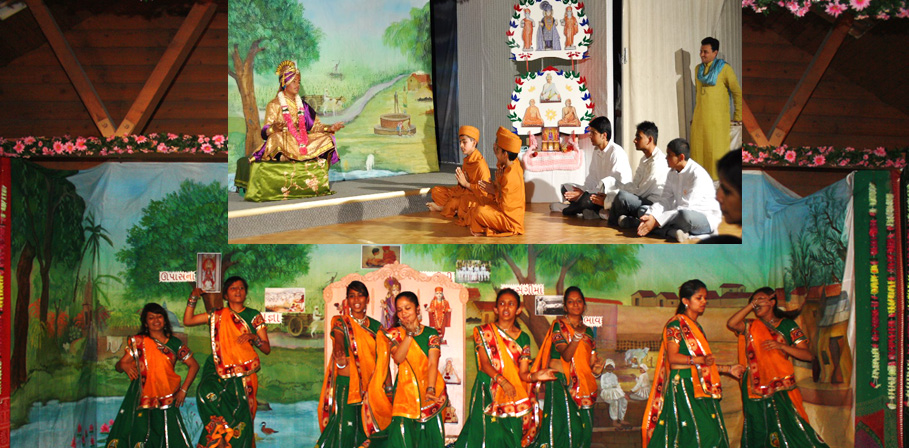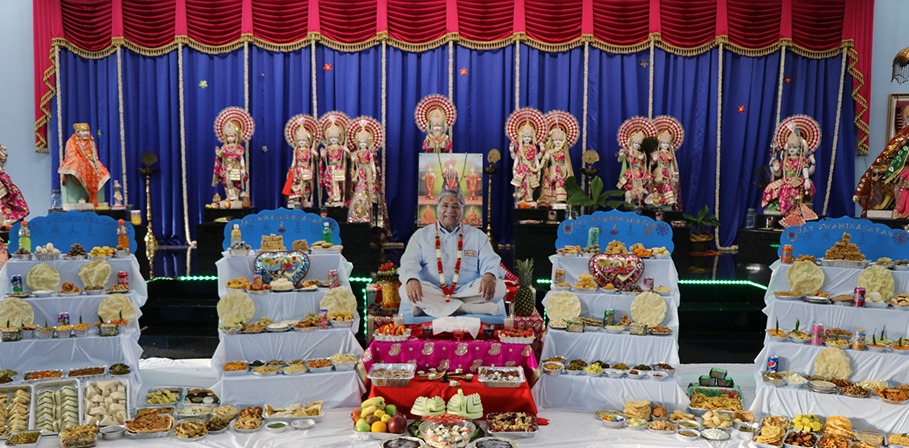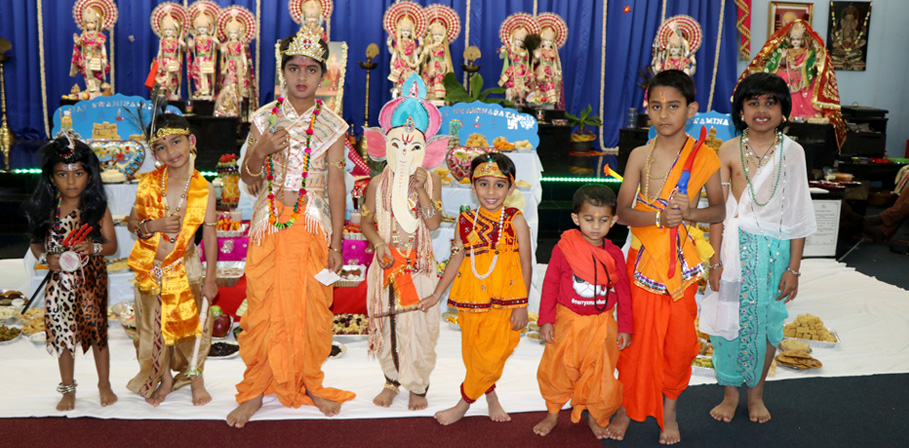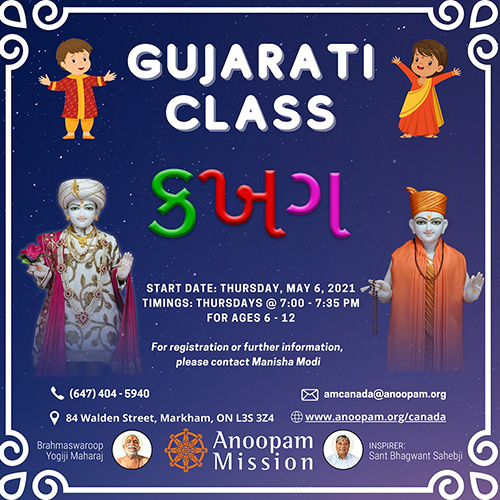Cultural Activities
Cultural Programs and Celebrations
Anoopam Mission Canada has organized and been involved in various cultural programs to showcase and promote cultural and spiritual awareness, through a combination of dancing, skit performances, and singing devotional hymns and songs with an array of instruments. In these programs, devotees, youth, and volunteers take part in dancing to devotional songs and hymns to symbolize their faithfulness, dedication, and piety towards their Guru. Skits are also used as a form of expression to re-enact various religious and spiritual encounters and to convey certain teachings and practices of Hinduism. These cultural celebrations and programs have been very beneficial for the community to learn about practices, beliefs, and historical events. This form of creative expression has also allowed devotees to deepen their understanding of Hinduism and its multifaceted nature, spreading culturalism while illustrating the faithfulness and unwavering dedication of the participants.

Diwali Celebration
Diwali is one of the most important celebrations in Hinduism, known as the festival of lights, marking the start of a New Year. Diwali indicates the triumph of light over evil. It was previously celebrated by Anoopam Mission Canada at the Sindhi Gurumandir temple in October of 2019. During Diwali, several diyas are lit across the temple, in homes, and prayers are done over goddess Laxshmi, who represents prosperity and wealth.
This is followed by a dinner that includes various traditional dishes and sweets, referred to as annakut, which translates to ‘a mountain of food’. Hundreds of different dishes and delicacies are offered to God on the day following Diwali to give thanks for everything God has given us. Several Anoopam Mission devotees prepare between 5-15 different dishes to offer and these dishes are organized in a very creative way as shown in the picture below. Fireworks also commence to mark this celebration and youth participate in various activities to understand and discuss the significance behind the festival.

Janmashtami Celebration – Dahi Handi
Janmashtami is the festival that celebrates the birth of Lord Krishna. On the day of Janmashtami, temples and household shrines are decorated with leaves and flowers, and sweets and traditional dishes are offered to God. Dahi Handi is a major celebration done during Janmashtami. This involves filling a clay pot with makhan (white butter) or other sweets and placing the pot between two trees about twenty feet high. This symbolizes Lord Krishna’s love for makhan, which he would often steal from homes when he was young. To commemorate this festival, Anoopam Mission devotees filled a clay pot with a variety of candy and chocolates and had children and youth form a human pyramid to break the pot open. This was followed by the youth telling stories about Lord Krishna’s childhood and the various lessons that can be learned from his experiences such as living in the present, being mindful of one’s actions, not exhibiting anger towards others, not being judgemental and developing and valuing genuine friendships, among many others.
Sant Bhagwant Sahebji’s Pragatyadin Celebration
A big celebration takes place on the day of “Dhuleti”, a holy indian festival of color which symbolizes the victory of good over evil and for Anoopam Mission’s spiritual leader, Sant Bhagwant Sahebji’s birthday. On this day, Sant Bhagwant Sahebji is welcomed with garlands and devotional songs, followed by various skits and dance performances by the Anoopam Mission youth. This day is to honour our Guru and all the blessings, guidance and spiritual wisdom that he has provided us with. During the coronavirus lockdown, this event was celebrated creatively by recording different videos and pictures that depicted precious qualities of Sant Bhagwant Sahebji such as selflessness, eradicating and charity work. Sant Bhagwant Sahebji gives his blessings and shares various stories about his gurus (leaders) and teaches many lessons about life such as “think positive and rest will be assured ” that help to promote positivity. On this day, many devotees share their experience on how their Guru has positively benefitted and changed their lives, how chanting with the memory of God and a Guru helps achieve inner peace and the importance of connecting with God. Younger youth also participate in various volunteer work such as spiritual speeches, performing arts and crafts and creative expression through singing and dancing.
Shri Hari Jayanti – Ramnavami Celebration
Ramnavami marks the day Lord Swaminarayan and Lord Rama were born. Fasting is observed on this day and devotees celebrate by singing devotional songs of Lord Swaminarayan. At the end of the fast, aarti, which is a traditional devotional song with the waving of lighted lamps in front of God, is performed at 10:10 PM to commemorate the time Lord Swaminarayan was born. Devotees also sit around and share stories and videos depicting the journey of Lord Swaminarayan from his childhood to adulthood, about his great work done for the community, for the environment, and for good mental and physical health. Additionally, this event is also celebrated to spread awareness among devotees and attaining in-depth knowledge of Hindu the culture.

Discourses and Seminars
Anoopam Mission Canada hosts various discourses to educate, promote and raise awareness of the Hindu philosophy, culture, and traditions for the advancement of knowledge and strengthening understanding of historical and modern-day practices and beliefs. These discourses include devotees, gurus, spiritual leaders, monks, and dignitaries around the world. They cover a range of topics including Hindu festivals to spiritual upliftment and practicing mindfulness. Anoopam Mission Canada organizes weekly baal sabha (spiritual sessions and activities for young children) and youth sabha that provides guidance on spirituality and explain the significance of having God and Guru in one’s life. Some seminars are also held for COVID-19 awareness, professional development and communication skills among youth of Anoopam Mission Canada.
Gujarati – Cultural Activities
 Learning an ethnic mother tongue language is an important aspect of cultural cultivation and preservation. The transmission of language provides an avenue for various generations to connect with each other and share teachings, lessons and stories. Gujarati, which originated in the state of Gujarat, India, is the native language of choice in our practices and has its roots deeply entrenched in Sanskrit. Anoopam Mission Canada offers language classes in Gujarati using a variety of resources and teaching methods to create an engaging and sociable environment. These classes serve as a means to ask questions, learn about phonology and practice pronunciation of key words and phrases utilized in the Gujarati language. Through these classes, many children and youth have been successful in communicating with elder generations and members of the community, as well as learn about the cultural significance behind certain words and phrases.
Learning an ethnic mother tongue language is an important aspect of cultural cultivation and preservation. The transmission of language provides an avenue for various generations to connect with each other and share teachings, lessons and stories. Gujarati, which originated in the state of Gujarat, India, is the native language of choice in our practices and has its roots deeply entrenched in Sanskrit. Anoopam Mission Canada offers language classes in Gujarati using a variety of resources and teaching methods to create an engaging and sociable environment. These classes serve as a means to ask questions, learn about phonology and practice pronunciation of key words and phrases utilized in the Gujarati language. Through these classes, many children and youth have been successful in communicating with elder generations and members of the community, as well as learn about the cultural significance behind certain words and phrases.
To Learn more on various activities being conducted by Anoopam Mission, visit our main website.
MAIN WEBSITE
